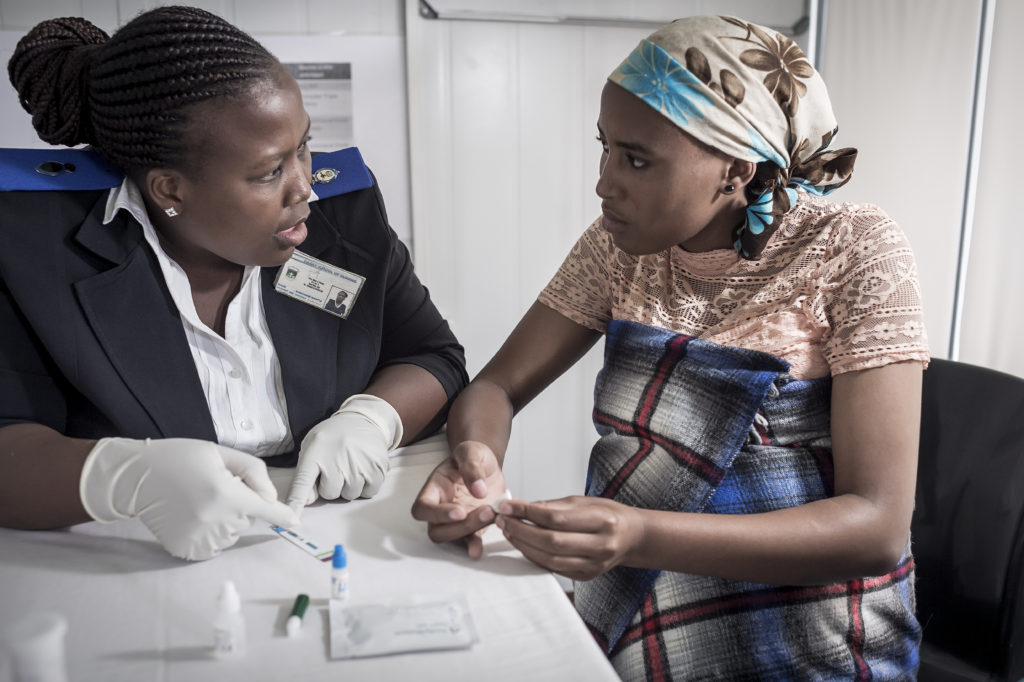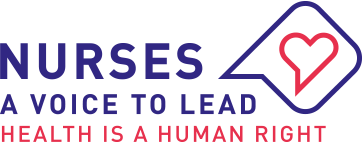Right to Care: Expanding Access to Health Care to Provide Complementary HIV Testing Services
It’s my first time testing for HIV & TB. My results gave me hope and a new life, I will make sure that I use protection all the time… - Community Member
Right to Care is at the vanguard of supporting and delivering prevention, care and treatment services for HIV and TB and other associated diseases. Located in Region A of the Northern Gateway to Johannesburg, the Right to Care service is staffed by two Registered Nurses and eight HIV Counsellors. Working closely with the community, the team provides comprehensive HIV Testing Services (HTS) such HIV counselling and testing, and access and initiation on ART. They also provide screening for tuberculosis, sexually transmitted infections (STIs) and, noncommunicable disease (NCD) along with pregnancy tests, and referral to medical circumcision. The availability of NCD screening contributes to HTS uptake and reducing stigma and discrimination. All community HTS outreach campaigns are focused and targeted on key hard-to-reach populations in underserviced areas, using mobile clinics to reach community members in various areas.
The organisation works in partnership with government and communities to find pioneering solutions to build and strengthening public health care. It embraces a strong entrepreneurial culture and focuses on innovation and the use of technology to enhance services, address skills shortages, and deliver quality health care outcomes. The areas of expertise include HIV and TB care and treatment, pharmacy automation, medical male circumcision, and cervical cancer diagnosis and treatment.
In Region A, there is a mixture of urban and rural living. The region has a number of informal settlements and is home to more than 250,000 people. Poverty and unemployment are major issues within this region. In one settlement of 56,000 people, the unemployment rate is higher than 50% and more than 70% of residents live below the poverty line. The population has low levels of education and is relatively young with approximately 24% of the population aged between 20-29.

As a result of these circumstances, there is a high burden of disease, particularly HIV. The traditional models of care have struggled to meet the needs of the community because of capacity and resourcing. As such, there is a low uptake of Provider-Initiated Counselling and Testing (PICT), poor coordination of data, a shortage of counsellors and space for counselling and testing. Another issue is that health facilities have limited opening hours and young school children are unable to access services. Sex workers also face difficulty in accessing health services.
The impact of the problem is devastating. There are an elevated number of orphans and children in distress caused by AIDS; and an increased number of clients requiring hospitalisation due to HIV-related illnesses because of late treatment, high cost to care, and a shortage of medical, nursing and allied health professionals.
By establishing relationships with all existing non-government, community-based organisations and holding monthly HTS forum meetings with all stakeholders, Right to Care has been able to impact the hard-to-reach communities and key populations, thus improving yield rate. It has linked clients to care and assisted in follow-up of defaulting patients or patients who do not present themselves in facilities. This platform allows all involved stakeholders to share their activities for the month, resulting in better coordination and sharing of data.
Collaborating with government and other non-government organisations, Right to Care provides information in culturally appropriate ways about how HIV is and is not transmitted. Through collaboration with sex workers and their managers, Right to Health is able to perform HTS, STIs, and Pre-exposure prophylaxis (PrEP) referrals and screen the risks that face them personally. By considering the diversity of young people and their needs, the service encourages a youth participation outreach campaign; focuses on young men’s sexual health; promotes greater awareness of sexual and reproductive rights; provides opportunities to address issues of gender; improves access to basic education and timely sex and HIV-related education; and provides access to HIV counselling and testing services.
The nursing staff within Right to Care also provides door-to-door client mobilization for HTS interventions, to mitigate the impact of shortage of counsellors in the facilities. The service reaches people who ordinarily face challenges in accessing HTS. It has led to an increase in demand for HTS, condoms distribution and education. During this intervention, outreach workers are able to mobilise more than one person in the household to access HTS and introduce direct service delivery teams to improve the performance and high yield rate.
As a result of this work, the number of people receiving care has more than doubled. For the first time, community members are able to access community based services within a timely and affordable manner.
“It’s my first-time testing for HIV & TB,” said one community member. “My results gave me hope and a new life, I will make sure that I use protection all the time…”
An LGBTI client said, ‘’I would rather get HIV services anywhere around my community, rather than standing in a long queue at the facilities.”

